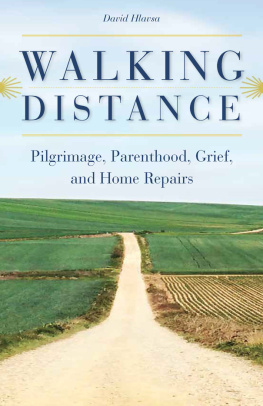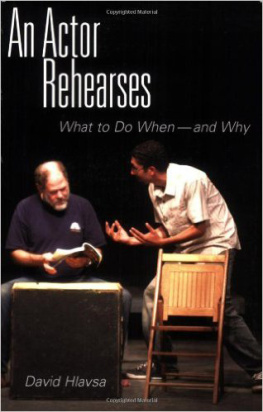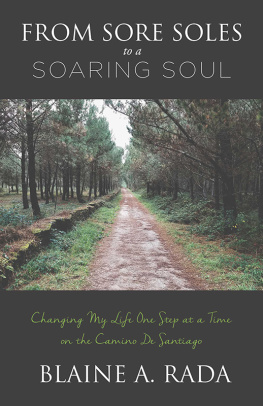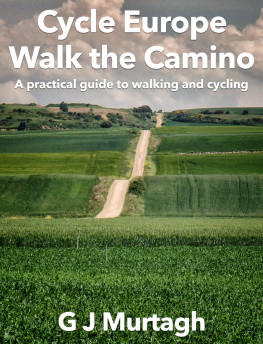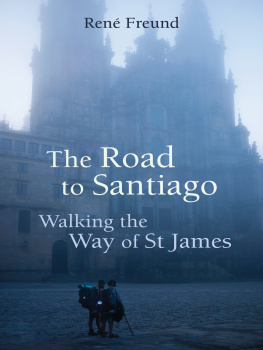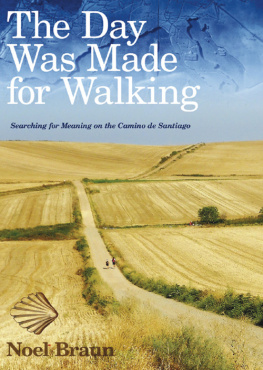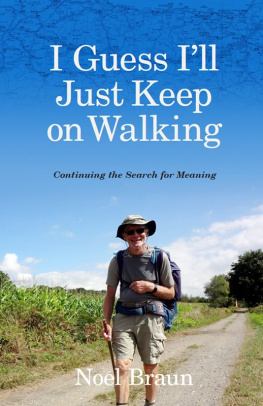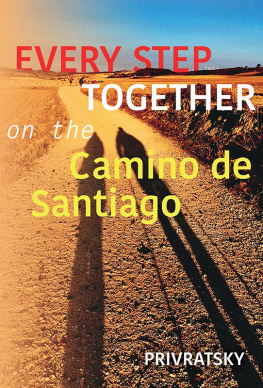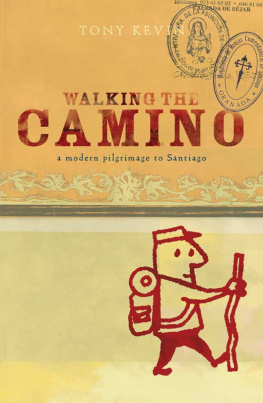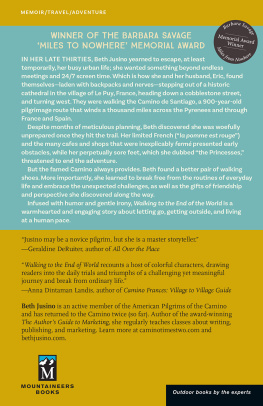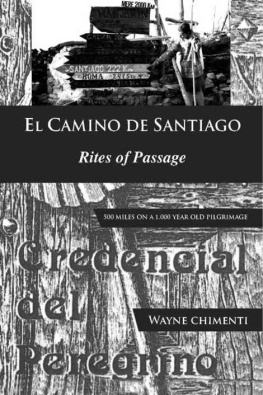ACKNOWLEDGMENTS
The plainest fact is: I married well.
When it comes to this book, my wife, Lisa Holtby, did everything but write it. The story is one in which a lot happens to Lisa, so what you may not realize from reading it is how much Lisa is a person who makes things happen. I write about a time in our marriage when Lisa was forced to depend on me, and so this book does notnot nearlygive the reader a sense of how much I depend on her.
Its not just that Lisa planned the trip to Spain, walked the miles, found and helped to renovate the house, and bore the children; when I first started writing about the experience of losing James, it was Lisa who suggested that people might want to read it. I demurred, but she persisted until I sent it in to the Modern Love column of the New York Times. Having that first article published led to offers to write other articles, which led me to suspect I had a book on my hands. Throughout, Lisa was a formidable and tireless editor, going over the various drafts of the book word by word, asking good questions, making suggestions, and gently (okay, sometimes not so gently) reining in my rhetorical excesses. All this while doing more than her share of the housework and child-rearing so that I could have time to write while still keeping my day job. And then, once I had a full manuscript, Lisa set the vision for getting it out to a wider audience.She held my hand and coached me through the process of designing a website, writing query letters, getting rejected, and finally finding an agent and a publisher.
This is a hard book to categorizeits part travel book, part home-repair saga, part meditation on griefbut more than anything, I wrote it as a love letter to my wife, and I hope thats how it reads.
Many thanks to Dani Shapiro and to my agent, Sam Stoloff of the Frances Goldin Literary Agency, for their enthusiastic support and for taking a chance on me; to the reviewers at Michigan State University Press for their detailed and useful critiques of the manuscript; to Olivia Archibald, Jeff Birkenstein, and the students in our creative writing class, who all gave good feedback on early drafts; to Dan Jones of the Times for seeing the real story under the story Id written; to my mother, Vivi Hlavsa, for her enthusiastic fandom, her insightful comments, and for teaching me to write in the first place; and, for advice and counsel, to Janel Atlas, Fred Albert, Ven. Dhammadinna, Henry Burton, David Hsieh, Andrea Allen, Holly Harmon, Joe Shirley, Kathleen Pape, Gabriella Mller, Ann Pelo, Beverly Harding Buehler, Gary Luke of Sasquatch Press, Meg Storey of Tinhouse Press, Jennifer McCord of Coffeetown Press, and Priscilla Long. Its been a long road; thanks to all who helped us along and apologies to anyone Ive neglected here.
1.
In the summer of the year 2000, Lisa and I walked the Camino de Santiago, the Way of Saint James, more than four hundred miles across the north of Spain from the Pyrenees to Santiago de Compostela. Shortly after our return, Lisa got pregnant. James was the only name we considered for a boy. Inasmuch as anything can prepare you for a birth, I suppose walking the Camino prepared us for his. And inasmuch as anything can prepare anyone, it prepared us for his death as well.
Unlike Everymans decision to go on pilgrimage, ours was neither involuntary nor did it happen all at once. Its arrival in our lives was not particularly momentous. There was no vision, no visitation. Nobody fell off a donkey. One day, in the tenth year of our marriage, Lisa and I were baking on a beach in the Caribbean. White sand, palms, light breeze, turquoise water, eighty degrees. We had good jobs: I had recently received tenure as a theater professor; Lisa was bringing in good money as a yoga teacher. We had some savings and a small co-op apartment in a hip Seattle neighborhood. No more low-budget road trips, car camping, sleeping on college friends couches, standby flights; these days, we could afford a real grown-up vacation.
The beach was full of sand fleas, and I was starting to burn. Im not really a beach kind of person, and I hate being a tourista visitor, isolated, surrounded by the vibrant life of a tropical island with no real way to be a part of it. Vacations and holidays have always been restless times for me. Something in me says: Why vacate? Why go on a retreat? I dont want to retreat; I want to advance. Instead, there we were: beached.
Of course, vacation wasnt the problem; the problem was me. It wasnt just that I was bored; any time I wasnt at work, I struggled with a combination of low-level anxiety and depression, a slight but perceptible dissociation from my domestic life, as if I had been given a mild sedative and could never quite emerge fully from its speedy, torpid blur.
At work, which, for a teacher, is infinitely expandable, I had classes to plan, students to cajole, committees to chair, resources to marshal, artists to collaborate with, deadlines, challenges. Add to these preoccupations the cycle of producing plays: each new cast a community forged in the attempt to make something fine, each rehearsal period a brief lifetime unto itself, and each closing night the end of a world. Its not that I was always happy at work, but when you get in the habit of trying to fill the hole in your heart with professional achievements, if youre any good at what you do, theres always just enough of a kick to the workday to keep you coming back for more.
Lisa once said accusingly, I think you like being at work a lot better than being at home. I thought about trying to reassure her that it wasnt so, but then I just nodded. She had me there.
During our courtship, I had wooed her with an old-fashioned fervor that, fortunately for me, she found charmingif sometimes a little overwhelming. Like a lot of men I know, I could be very good at the initial pursuit, but once I got the girl, I wasnt quite sure what to do with her. However hard I tried to be a good husband, it seemed there was always a part of me disengaged from the action of marriage, the shared effort of making a life together. I was at home at work and a tourist in my home.
I rolled over on my towel and muttered something to Lisa about wishing our time off from work had more of a sense of purpose.
Sometimes a simple remark just unfolds and unfolds. At first it looks like any other wrinkled scrap of thought. But then, as you smooth it out, it expands impossibly, all out of proportion. You want to see it in full, so you start to push other things aside to accommodate it. At first the unfolding seems like a game, anabsurd magic trick, but then it takes up the whole room, and you stare at whats before you, stunned: you realize its a map of the territory ahead.
I trace my very existence back to a simple remark. My parents were in college, still in their teens; my father, a tall, gangly, quiet kid who liked to play basketball as long as no one took the game too seriously, and my mother, curvy, dark-haired, intense in her convictions, were midway through a conversation about something else when he turned to her and, so the story goes, blurted out, So, do you want to get married or not?
So, having arrived at this very comfortable place in our lives, where did Lisa and I want to go from here, and what would make the journey more purposeful? When we got home from the Caribbean, we started to reconsider not just our vacation plans, but our destinations in general. Marriage, like pregnancy, is both an either/or proposition and a work in progress. How married were we? We both felt we could be more married. My tolerance for intimacy, for instance: Lisa opined that it might be a good idea for me to make some improvements in that area. And I replied that such an improvement should probably be accompanied by an expansion of Lisas tolerance for, well,

